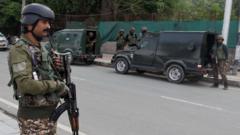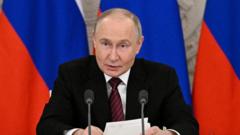Both countries show commitment to peace, but skepticism remains high as explosions are reported.
India-Pakistan Ceasefire Survives Initial Violations Amid Rising Tensions

India-Pakistan Ceasefire Survives Initial Violations Amid Rising Tensions
Concerns loom as cross-border disputes continue despite ceasefire declaration.
In a significant development, the ceasefire agreement between India and Pakistan appears to be holding, despite both nations accusing each other of violations shortly after the arrangement was made public. The ceasefire, brokered by the United States, comes at a time when escalating military actions had marked the prior days, reflecting the worst confrontations seen between the two neighbors in recent history.
Former US President Donald Trump lauded both nations' leaders for their willingness to agree to the ceasefire in a statement made on Sunday. He highlighted the potential humanitarian crisis that could have arisen without the ceasefire, stressing that millions might have faced dire consequences. This declaration followed reports of explosions in Jammu and Srinagar mere hours after the agreement was announced, urging rapid calls for accountability.
The military skirmishes started when India targeted sites in Pakistan and regions under Pakistani control in response to a militant attack in Pahalgam. Pakistani officials vehemently denied involvement, reaffirming their commitment to peaceful negotiations. Trump utilized his social media platform to announce the ceasefire’s “full and immediate” effect on Saturday, with an emphasis on U.S. mediation.
Later, Pakistani Foreign Minister acknowledged the confirmation of the ceasefire but also noted ongoing violations attributed to India. He urged restraint among troops on both sides, illustrating the tense atmosphere that remains. Indian officials reported continued provocations from across the border but expressed a commitment to holding discussions aimed at long-term resolution.
The territorial dispute over Kashmir has been a historical flashpoint, simmering since the partition of British India in 1947. Both countries, nuclear powers, have previously engaged in two wars regarding the region, making this current agreement a crucial step towards preventing further escalation.
Indian External Affairs Minister S. Jaishankar emphasized their firm stance against terrorism while confirming the ceasefire’s validity. Prime Minister of Pakistan, Shehbaz Sharif, expressed hope that the truce serves the common good for citizens across both nations.
As international attention turns to the situation, U.S. Secretary of State Marco Rubio confirmed intentions to facilitate talks on a wider array of issues, underscoring the U.S. role in pursuing diplomatic solutions.
UN Secretary General Antonio Guterres applauded both nations' efforts to de-escalate the crisis, while UK Prime Minister, Sir Keir Starmer, expressed his satisfaction with the ceasefire, urging for it to be enduring.
The recent military engagements were ignited by the tragic deaths of tourists in Pahalgam, where 25 Indians and a Nepali national lost their lives in a militant strike, igniting previous tensions between the countries. Both sides reported significant civilian casualties in the ongoing exchanges, leaving the atmosphere fraught with skepticism. As ceasefire holds momentarily, the international community remains vigilant for lasting peace solutions between these two nuclear-armed neighbors.
Former US President Donald Trump lauded both nations' leaders for their willingness to agree to the ceasefire in a statement made on Sunday. He highlighted the potential humanitarian crisis that could have arisen without the ceasefire, stressing that millions might have faced dire consequences. This declaration followed reports of explosions in Jammu and Srinagar mere hours after the agreement was announced, urging rapid calls for accountability.
The military skirmishes started when India targeted sites in Pakistan and regions under Pakistani control in response to a militant attack in Pahalgam. Pakistani officials vehemently denied involvement, reaffirming their commitment to peaceful negotiations. Trump utilized his social media platform to announce the ceasefire’s “full and immediate” effect on Saturday, with an emphasis on U.S. mediation.
Later, Pakistani Foreign Minister acknowledged the confirmation of the ceasefire but also noted ongoing violations attributed to India. He urged restraint among troops on both sides, illustrating the tense atmosphere that remains. Indian officials reported continued provocations from across the border but expressed a commitment to holding discussions aimed at long-term resolution.
The territorial dispute over Kashmir has been a historical flashpoint, simmering since the partition of British India in 1947. Both countries, nuclear powers, have previously engaged in two wars regarding the region, making this current agreement a crucial step towards preventing further escalation.
Indian External Affairs Minister S. Jaishankar emphasized their firm stance against terrorism while confirming the ceasefire’s validity. Prime Minister of Pakistan, Shehbaz Sharif, expressed hope that the truce serves the common good for citizens across both nations.
As international attention turns to the situation, U.S. Secretary of State Marco Rubio confirmed intentions to facilitate talks on a wider array of issues, underscoring the U.S. role in pursuing diplomatic solutions.
UN Secretary General Antonio Guterres applauded both nations' efforts to de-escalate the crisis, while UK Prime Minister, Sir Keir Starmer, expressed his satisfaction with the ceasefire, urging for it to be enduring.
The recent military engagements were ignited by the tragic deaths of tourists in Pahalgam, where 25 Indians and a Nepali national lost their lives in a militant strike, igniting previous tensions between the countries. Both sides reported significant civilian casualties in the ongoing exchanges, leaving the atmosphere fraught with skepticism. As ceasefire holds momentarily, the international community remains vigilant for lasting peace solutions between these two nuclear-armed neighbors.




















